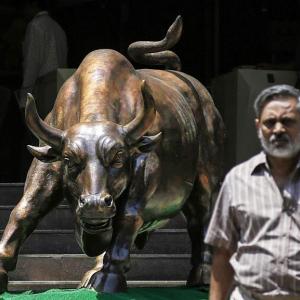'What I consider a risk to India is the failure of the economy to recover.'

There are only a few attractive markets in the world, and India is one, says Geoffrey Dennis, head of global emerging markets strategy, UBS Investment Bank.
But, the Indian market is expensive and remains vulnerable to foreign outflows, he adds.
In an interview to Samie Modak, he says that investors will be upset if expectations of growth pick-up are not fulfilled.
How attractive is the Indian market for you?
We are overweight on India, as it is one of the best in emerging markets (EMs). That, to be fair, is partly because we don't see a lot of attractive markets out there.
In India, earnings growth is better than in most EMs. Investors are prepared to pay a valuation premium to get access here. By 2017, China will be growing at 5.8 per cent (annually) and India at 7.8 per cent.
Despite the uncertainty and continuous setbacks on the reform front, we think structural reform in Narendra Modi’s full term is going to make progress. This will help the growth story.
India also benefits from lower oil prices. There are a number of things going for it.
But, it trades expensively, at about 18 times forward earnings against the long-term average of 14.5 times.
Some premiums might be justified but at the end of the day, the valuations are high. Also, the market is consensus overweight, which means it is vulnerable to bad news.
And, over the past three-four quarters, the earnings story has slowed.

What are the key risks for the Indian market?
What I consider a risk to India is the failure of the economy to recover. It has to grow more rapidly. Another risk is more disappointments on earnings.
And, of course, a sharp rebound in the price of oil. A lot of investors are overweight and heavily positioned on the Indian market.
That makes India very vulnerable to bad news. I think the worst news would be real evidence that the expectations of growth pick-up will not be fulfilled.
Failing to keep (annual) growth above 7.5 per cent can hit India really badly. People (investors) are in India as it is a growth story.
This hasn’t been a great year for EMs. Did you expect this kind of volatility and foreign outflows?
We have been surprised by how weak the markets have been.
What has surprised is the general weakness of EM currencies against the dollar.
Also, commodity prices have been weaker than we thought. Foreign investor flows are driven by the market.
So, the weakness in the market has caused the outflows to occur. If the market improves, the flows will return.
Where have the $60-odd billion outflows from EMs gone?
Very hard to say. I’d imagine to an extent they would have stayed in the equity asset class - might have gone into the US or the developed world, generally.
I imagine some is being put into fixed income, which continues to do better than most of us thought. Because of the difficult market conditions this year, some are holding cash.
A rise in rates by the US Federal Reserve in December is now almost a given. How do you see it playing out?
Ahead of the September meeting, the Fed’s move was essentially priced in the EMs.
We sold off by nearly 20 per cent up to the middle of December. Once the Fed didn’t raise rates, we had a rally.
Now, the Fed has come back on the scene and the markets have sold off again. Roughly, we are where we were just ahead of September.
So, I think we have priced this thing in. I don’t rule out some short-term volatility but it seems to be a pretty clear case that the Fed is going to move. So, it will hardly be a surprise.
What will drive the markets now will be what the Fed says about future rate increases. We are seeing they are going to stay relatively dovish.
Our argument is, EMs will do better if the Fed raises rates, by, let's say, three or four times by the end of next year if there is growth.
This is better than if they leave it to zero and there is no growth. So, I fully expect the market doing well over a six-month horizon if the Fed raises rates. For, that will mean growth is good.
The market has been spooked by global growth concerns. How big a concern will it be over the next year?
I don’t think we will see a further significant slowdown. We won’t end up in a situation where the global economy goes into recession.
Growth continues to be disappointing. It continues to be sub-par in this economic cycle, compared to the previous one.
The EM world is growing 4.1 per cent this year and 4.3 per cent next year, a little bit of an uptick.
But, we are still in the four to five per cent range. In the earlier cycle, we were growing at seven-eight per cent.
Meanwhile, the developed world is going to grow at not more than two per cent. So, it is not a recession but a disappointment. We have put that down to some basics.
One is weakness in commodity prices, playing a direct role in other countries' growth. Second, we are concerned as a house about debt. The level has built up.
Maybe not to cause a crisis but the levels in consumer (debt) in places like Korea and Brazil, the corporate debt level in China, are something that kind of caps the growth rate. It prevents the economy growing as rapidly as it would otherwise.
What are the reasons to be positive on EMs?
There has been no earnings growth in EMs for five years in dollar terms. The structural factors are still there - weak GDP growth, weak world trade growth and weak performance of companies.
Maybe some of that will now begin to come to an end. What we think will happen next year is that you are going to have a bounce in earnings and the weakness in commodity prices will not be repeated to the same extent.
I think you will get a statistical bounce in earnings next year that will give you a better year but it will still not be a great year, as these secular factors are still negative.
What is your view on oil and commodity prices?
Compared to this year, you will get better earnings in commodities next year.
However, we would rather buy oil between the two sectors. We have called the bottom for oil prices.
If their prices rebound over the 12-18 months it will support the energy sector.
We are much less convinced about metal prices, as rebalancing of the Chinese economy is going on very rapidly.
With that, you have downward pressure on metal prices.










